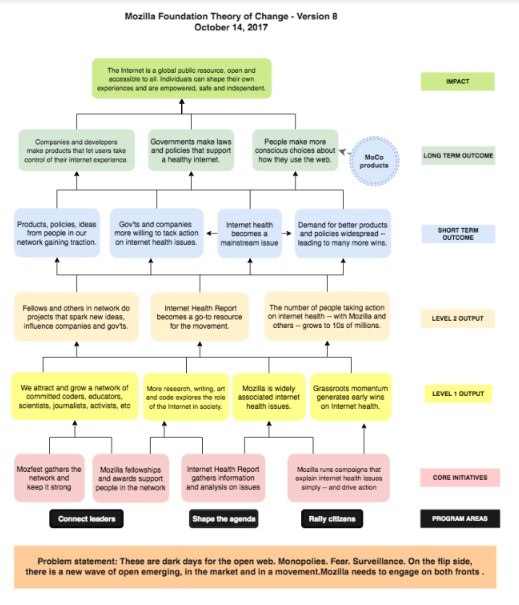Foundation/AITheoryofChange
Mozilla has decided to focus on ‘better machine decision making’ as a theme and impact goal that will cut across our fellowships, campaigns and thought leadership work in the internet health movement over the coming years. As we say in our draft issue brief:
Mozilla wants to ensure AI serves humans rather than harms them. We're particularly interested in how automated decision making is becoming integral to large consumer tech platforms, from social networks to shopping sites to smart speakers. We want to make sure the interests of everyday users are designed into these platforms. Where they aren't, we want to call that out.
To drive this work, we need a thematic goal with a clear theory of change that Mozilla and its allies can go after in a distributed, decentralized manner.
Purpose
The goal of this project is to enable Mozilla and our allies to take coordinated and decentralized action in a shared direction. The goal being collective impact in the area of better machine decision making.
The theory of change for this theme will build on the existing Mozilla Foundation theory of change as a base -- see appendix below for more detail.
Goal
The theory of change will define:
- Tangible changes in the world we and others will pursue (aka long term outcomes)
- Strategies that we and others might use to pursue these outcomes
- Results we will hold ourselves accountable to
How we’ll get there
Phase 1: Get started
Activities
- Literature Review - February 2019 - further analysis forthcoming
- Consumer tech definition - blog to be released late April
- Ethics frameworks - under review
- Analyze trends from interviews - under review
Outputs
- Goals & timeline: you’re looking at them!
- Decision to focus on consumer tech - forthcoming
- Short-list of potential impact statements and outcomes, for broader input - May, 2019
- Criteria for choosing impact statements/outcomes and who will decide - May, 2019
Phase 2: Work open to refine with staff & the movement
In order to… Build a foundation for decentralized action toward a shared goal, by fostering co-ownership and walking the ‘working open’ walk. We must.... Test and validate with technical and expert audiences.
Activities
- Host an open process for feedback on short-list of potential impact statements and outcomes.
Outputs
- Analysis and recommendations re: outcomes from open consultation
- Decisions re: the impact statement and outcomes MoFo will use
Phase 3: Share & use
Activities Share decisions re: the impact statement and outcomes MoFo will use MoFo teams incorporate focuses into their H2 planning Flesh out next steps in this process, to get to a full theory of change
Outputs MoFo org and team plans for H2 that incorporate the AI impact statement and outcomes
Assumptions informing this project
- MoFo’s focus on AI exists within the broader internet health framework (read more here).
- We're using the org-wide theory of change as a basis through which to get specific on outcomes and outputs for the better machine decision making goal.
- We chose AI as our focus because it is the next generation of computing and internet technology. We don’t see AI as one homogeneous thing, but as a complex computational field with a multitude of different possible manifestations and applications.
- We’re not assuming that AI will necessarily have a negative impact on the world. But we do believe that it requires intention and effort to ensure AI will have a positive impact on the world. Building our internet health values into this space can have real and positive impact on how people experience digital life.
- We plan to focus on how automated decision making is being used in consumer products and services. <-- blog on this topic forthcoming
- The AI theory of change is unlikely to have a geographic focus built in. This doesn’t mean we can’t be explicit about where in the world our work will focus -- this is just more likely to happen at the program or initiative level.
Timeline
April 2019
- Project initiation and design
- Short-list impact goal statements & sample outcomes, and determine how to move forward
- Discuss assumptions & definition of ‘consumer tech’ with staff/board
- Comment period phase 1: open to Mozilla Foundation staff and key Mozilla Corporation/external allies
- Bug hunting, content tweaks
- Start ‘open consultation’ process, where staff and external allies can give input on ToC impact statement and potential outcomes
May 2019
- Commenting period phase 2: open to the public
- 1:1 reach out to experts and allies? (Include Program Committee here)
- May 9 Board Program Committee Meeting (tentative)
- May 26 Commenting period closes
- Synthesis of feedback from ‘open consultation’ process → move to decision making
- Synthesis
- Decision making
June
- June 5 Board Program Committee Meeting
- All Hands
- Public report-back
- Impact, long-term outcomes, short-term outcomes defined
July
- July 8 Full Board Meeting - including a day with allies (end of phase 1, start of phase 2)
October
- Better machine decision making theory of change complete
Roles
Mark Surman is Accountable and Sam Burton is Responsible for this project. The project will engage both internal and external stakeholders, and the decision makers are Mark Surman and the Mozilla Foundation Board.
